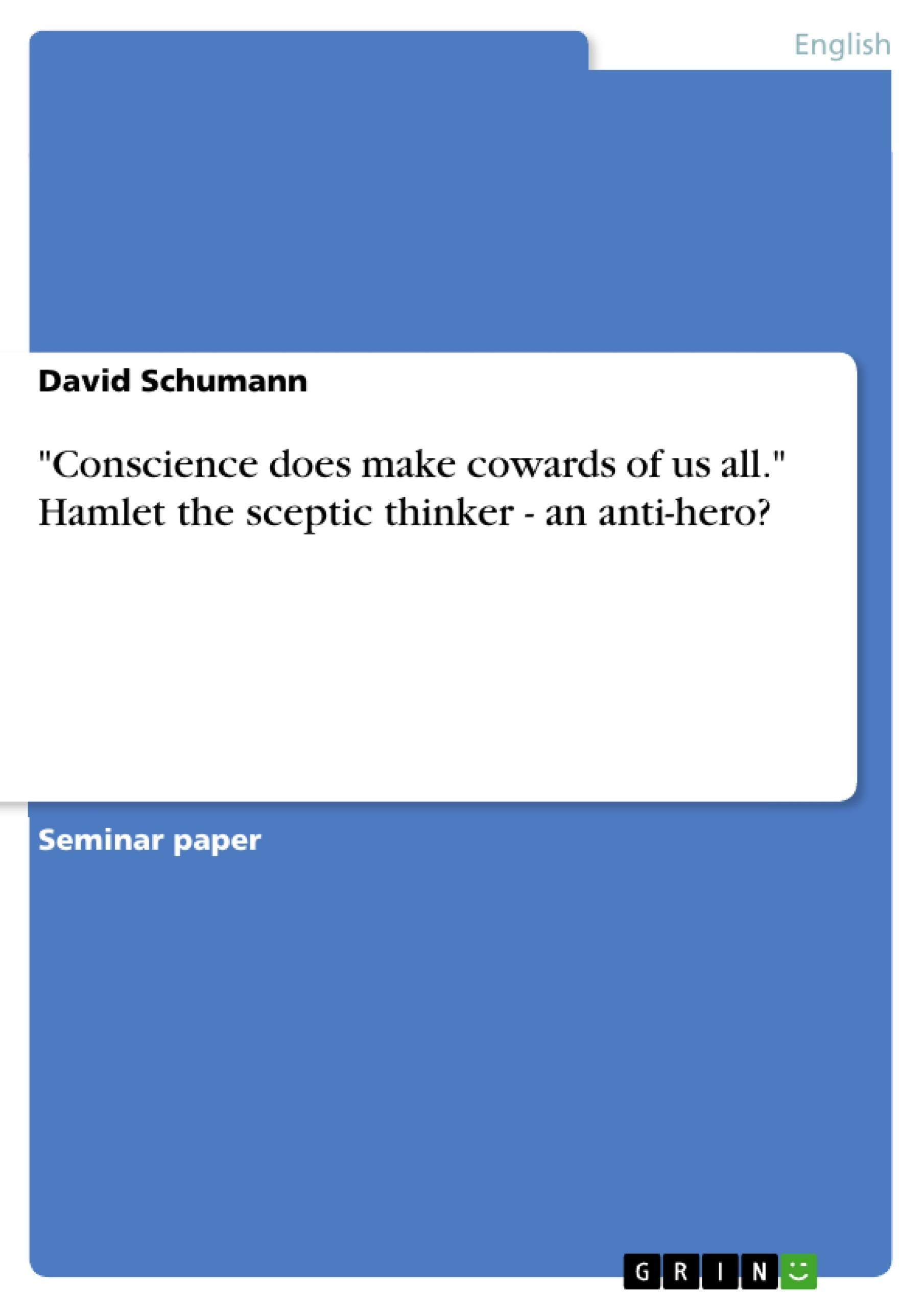As the protagonist of Shakespeare’s play Hamlet, the young Hamlet, Prince of Denmark, is popularly considered a heroic figure, revenging the murder of his father who was poisoned by Claudius, Hamlet’s uncle. He appears to be an archetypical Renaissance figure, a versatile character that contains something of everything within him: “He is the sophisticated thinker and the powerless politician; the resentful child and the sober student; the moral Puritan and the deranged Prince; the witty murderer and the cold-blooded jester.”
Since Michael Davies speaks of Hamlet’s supposed renaissance variety “as a compendium of selves” and therefore of a rather “modern man of no fixed identity”, we will in the context of this work examine the question whether Hamlet could be considered an anti-hero by pointing out certain traits of his introverted nature and the significant impact of self-reflection on Hamlet’s behaviour throughout the play.
Table of Contents
- Introduction
- The birth of Hamlet the avenger
- Hamlet the sceptic thinker – an anti-hero?
- The soliloquy as an evidence for Hamlet's antiheroism
- Conclusion
Objectives and Key Themes
This work examines the question of whether Hamlet, the protagonist of Shakespeare's play, can be considered an anti-hero by analyzing his introverted nature and the significant impact of self-reflection on his behavior throughout the play.
- Hamlet's identity as an avenger and its destabilization
- Hamlet's coping with the burden of revenge and its impact on his behavior
- The role of Hamlet's soliloquies in revealing his self-doubts and philosophical thoughts
- The characteristics of a literary anti-hero and their relevance to Hamlet's portrayal
- The notion of heroic ideals and their contrast with Hamlet's actions
Chapter Summaries
The first chapter explores the transformation of Hamlet's identity as he is tasked with avenging his father's murder. This chapter analyzes the destabilization of Hamlet's identity and the emergence of self-doubt as he grapples with the new role of avenger. The chapter concludes by highlighting how the burden of revenge serves as a catalyst for Hamlet's introspective nature.
The second chapter focuses on Hamlet's struggle with the burden of revenge, examining his actions and thoughts that suggest non-heroic behavior. This chapter explores the tension between heroic expectations and Hamlet's internal conflicts, highlighting the complexities of his identity.
Keywords
This work explores the character of Hamlet, focusing on his introspective nature, his struggles with revenge, and the complexities of his identity. Key concepts include anti-hero, self-reflection, soliloquy, heroic ideals, and the destabilization of identity.
Frequently Asked Questions
Can Hamlet be considered an anti-hero?
The work examines this question by analyzing Hamlet’s introverted nature, his self-reflection, and how his non-heroic behaviors contrast with traditional heroic ideals of the Renaissance.
What does the phrase "modern man of no fixed identity" mean for Hamlet?
It refers to Michael Davies’ view of Hamlet as a "compendium of selves," suggesting that Hamlet lacks a single, stable identity, which makes him a more complex and modern character than a typical archetypal hero.
How do soliloquies serve as evidence of Hamlet's anti-heroism?
Hamlet’s soliloquies reveal his deep self-doubts, philosophical hesitations, and internal conflicts. These moments of introspection highlight his struggle to act, which is a key trait of a literary anti-hero.
How does the burden of revenge affect Hamlet's identity?
Tasked with avenging his father, Hamlet experiences a destabilization of identity. The burden of this role acts as a catalyst for his introspective nature and leads to behaviors that diverge from traditional expectations of an avenger.
What is the role of self-reflection in the play?
Self-reflection has a significant impact on Hamlet's behavior, often paralyzing his ability to take decisive action and transforming him from a simple "avenger" into a skeptical thinker.
- Citar trabajo
- David Schumann (Autor), 2013, "Conscience does make cowards of us all." Hamlet the sceptic thinker - an anti-hero?, Múnich, GRIN Verlag, https://www.grin.com/document/262470



